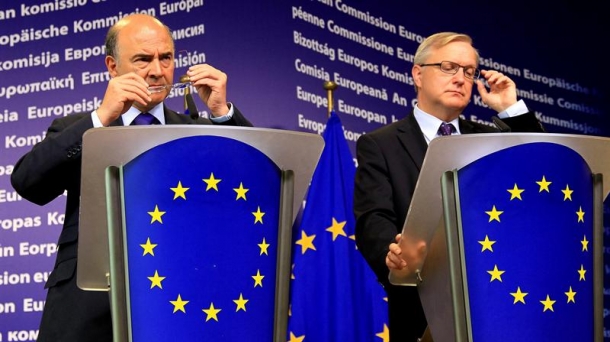news
Euro zone debt crisis
France says ESM Spain aid would mean bank supervision
Reuters
Paris
Amid reports that Berlin is pushing Madrid to seek European aid to draw a line under its banking crisis, Moscovici said it was up to Spain to decide whether it needed outside help and what kind.
-

Moscovici and Olli Rehn. Photo: EFE
The use of the euro zone's future ESM rescue fund to directly recapitalise struggling Spanish banks would mean imposing conditionality in terms of banking supervision, not economic reforms, French Finance Minister Pierre Moscovici said on Wednesday.
Moscovici, who is due to meet his Spanish counterpart Luis de Guindos later on Wednesday, said the euro zone's existing EFSF bailout fund could also be used if aid were urgently required in the short term, before the ESM takes effect later this year.
Spain's borrowing costs have shot up to levels that many experts consider unsustainable over concerns about the cost of bailing out the countries' troubled banks. Treasury Minister Cristobal Montoro said on Tuesday that at current rates, markets were effectively off limits to Spain.
Amid reports that Berlin is pushing Madrid to seek European aid to draw a line under its banking crisis, Moscovici said it was up to Spain to decide whether it needed outside help and what kind.
"If the Spanish government wishes, and it decides so independently, we have instruments of solidarity which can be mobilised very quickly," Moscovici told a news conference in Paris, adding that he would discuss this with De Guindos.
"France favours the ESM being used to directly recapitalise banks with the appropriate supervisory conditions," Moscovici said, noting this option would be discussed by European leaders at a summit at the end of June.
"The EFSF also already exists and can intervene through loans to the Spanish state for the recapitalisation of financial institutions."
Moscovici appeared to suggest it would not be necessary for Spain to seek a full EU/IMF programme - which could imply onerous conditions in terms of economic reform - to gain financial support for its banking sector, which is tottering under the mounting weight of bad property loans.
He praised at length the economic reforms already undertaken by Prime Minister Mariano Rajoy's government to pare down the deficit and improve Spain's competitiveness.
German officials also said on Wednesday that a deal was in the works which would allow Spain to recapitalise its stricken banks using EU aid but avoid economic reforms imposed from outside.
De Guindos said on Wednesday in Brussels that Madrid would make no decision on whether to seek European aid in recapitalising its banking systems until the results of analyses by the IMF and independent auditors were known.
With the EU Commission warning last month that France needed to undertake spending cuts and structural reforms to meet an EU deficit target of 3 percent this year, Moscovici said that Paris would honour its commitments.
"Reaching 3 percent is an undertaking which will be met... but it is natural that a country like France should decide its own means of getting there," Moscovici said.
He declined, however, to provide any details of budgetary plans until after a review of state finances is completed by the Court des Comptes - the state auditor - later this month.
France's Socialist government faces parliamentary elections on June 10 and 17 which will determine its ability to pass legislation over the next five years. Political analysts say it is reluctant to announce unpopular budgetary measures before the elections.
top stories



-
news
New anti-eviction law
Andalucia begins proceedings to seize confiscated houses from banks
-
news
London attack
British police ponder conspiracy after soldier murder
-
Sport
Giro d'Italia
Nibali tightens grip on overall lead after stage victory
© EITB - 2024 - Privacy Policy - Legal disclaimer - Cookie Policy - Cookie settings


